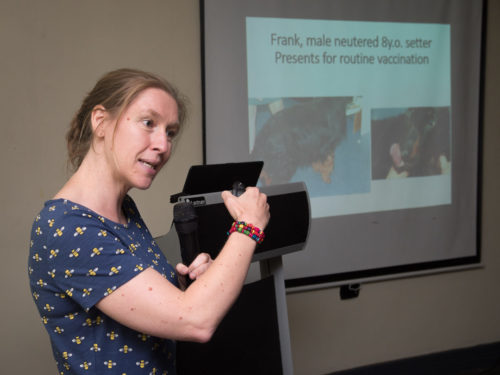
Zoe is a veterinary surgeon who graduated from Cambridge University in 2003 and is a European and RCVS Recognised Specialist in small animal internal medicine with interests in geriatric medicine and the decisions made by people on behalf of pets. She has worked in general practice, referral clinics, university teaching hospitals and charity practice. Her mixed methods PhD at the Centre for Evidence-based Veterinary Medicine, University of Nottingham explored how vets and owners make decisions about dogs with osteoarthritis. Zoe has published over 20 peer reviewed journal articles in a range of journals about subjects including quality of life assessment, canine osteoarthritis and nasal tumours. She has extensive lecturing and small group teaching experience in the UK, Eastern Europe and sub-Saharan Africa, and was on the World Small Animal Veterinary Association continuing education panel from 2011-2018, acting as Chair for the last two years. She currently combines general practice clinical work at PDSA Nottingham with veterinary consultancy, research, membership of the RCVS Ethical Review Panel and editing “What is your client thinking”, a column in the Veterinary Record written by owners and farmers.
My HBC expertise is in communicating ideas and problem solving barriers to change in applied settings.
A chat with Zoe
Tell us a little bit about you and your journey into behaviour change in relation to improving the lives of animals?
I first became really interested in behaviour change when as a vet student I co-led a trip to Cajamarca in the Peruvian Andes to explore the prevalence of mastitis in hand milked cows owned by farmers who lived in the mountains. It was my first real experience of veterinary related fieldwork, and interviewing the women whose livelihoods depended on their handful of cows was an amazing experience. Many of their cows had mastitis which were being treated with expensive antibiotics, but watching them milk we could see that some very basic changes in hygiene could make a huge difference. Nobody had asked them how they milked or stopped to watch them before – a powerful lesson. After gaining my clinical specialism in dog and cat internal medicine, I started to work with the World Small Animal Veterinary Association (WSAVA) to improve education of vets in south-eastern Europe and sub-Saharan Africa where dog and cat medicine is not well taught in vet schools. I learnt with time that meaningful teaching in this context involved looking at barriers to change, both amongst vets and owners, and helping them think through solutions. Alongside this, I completed a PhD at the University of Nottingham in 2016 which involved interviewing owners and vets about their experiences of managing dogs with osteoarthritis. This was a great exposure to the motivators and barriers to change in the UK pet owning population, and I was fortunate to be able to attend some great courses about both qualitative research methods and how to convert knowledge into action at Oxford University during my training. I now try to apply all of this when I’m consulting at the PDSA hospital in which I work.
Why does behaviour change matter?
I’ve learnt through my career that unless you understand what motivates someone to do what they do, and what barriers prevent them from doing something different, it’s very hard to get them to change. Improving animal welfare almost always involves the person responsible for the animal changing some aspect of their own behaviour, so it’s vital to understand how best to help them do this.
Most inspiring behaviour change intervention (animal welfare or other) and why?
The amazing Blue Planet tv series has done a phenomenal job at waking people up to the perils of plastic in our oceans. The combination of urgent messaging from Sir David Attenborough who is universally respected and trusted, moving images of the undeniable problems associated with plastic and a simple, achievable message of replacing plastic with more biodegradable options has led to a amazing, visible change in shopping habits.
What’s your vision for behaviour change for the next five years?
I’d love to see UK veterinary curricula and conferences focus more on the people who look after the animals we treat and why sometimes they can’t and don’t do the things we advocate. At the moment, owners and farmers get little attention other than in basic communication skills teaching and I really believe that’s a big barrier to improving animal welfare.
How did you become involved with Human Behaviour Change for Animals?
I was very lucky that WSAVA enrolled me in a course put together by Suz to learn how to facilitate small groups to empower behaviour change. It was great timing after my PhD and it gave me the skills and confidence to change how I run workshops. Suz and Jo then kindly invited me to run a session at the recent HBCA conference on setting up focus groups.
Why do you like working with HBCA?
It’s great to be associated with a group who understand the importance of behaviour change and have so much practical experience in interventions that have led to positive improvements in animal welfare. The depth and breadth of knowledge in this organisation is amazing and very inspiring.
Top tip for organisations getting started with behaviour change?
Spend time with the people whose behaviour you want to change. Make sure you understand what they do now and why, and ensure they understand the relevance to them of why it is that you want them to do something different. Then work together to find a feasible pathway to change that works in their setting. Don’t expect things to happen overnight, and praise even the smallest changes.
Specialisms
- Qualitative research methods (interviews, focus groups and thematic analysis of transcripts)
- Exploring motivators and barriers to change in real-world settings
- Communicating ideas
- Running workshops and small group training sessions
Connect with Zoe:
Twitter: @ZotVet

